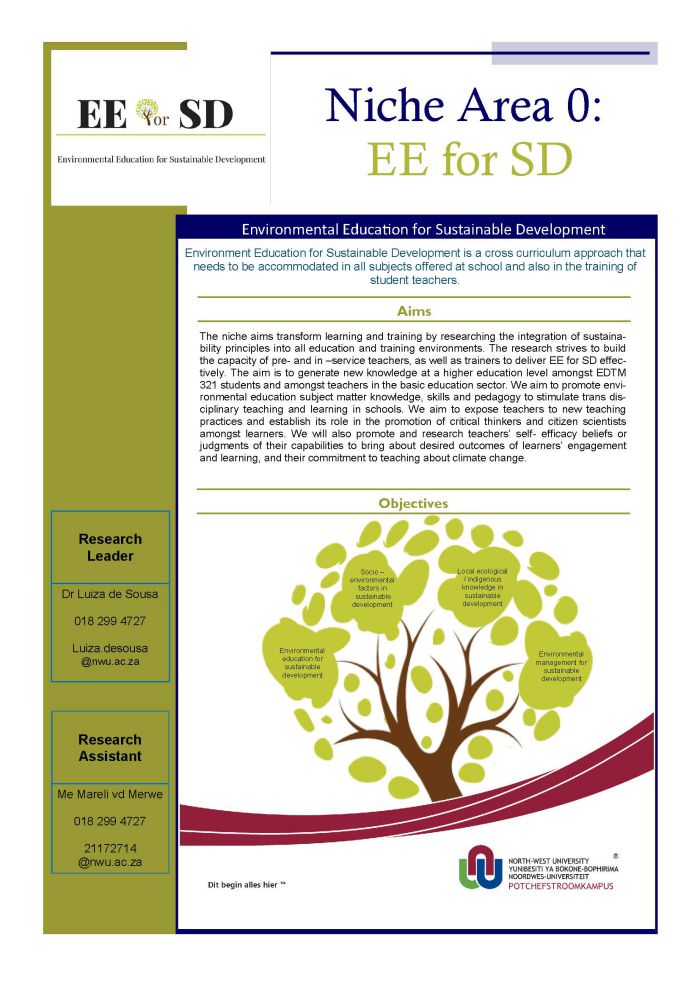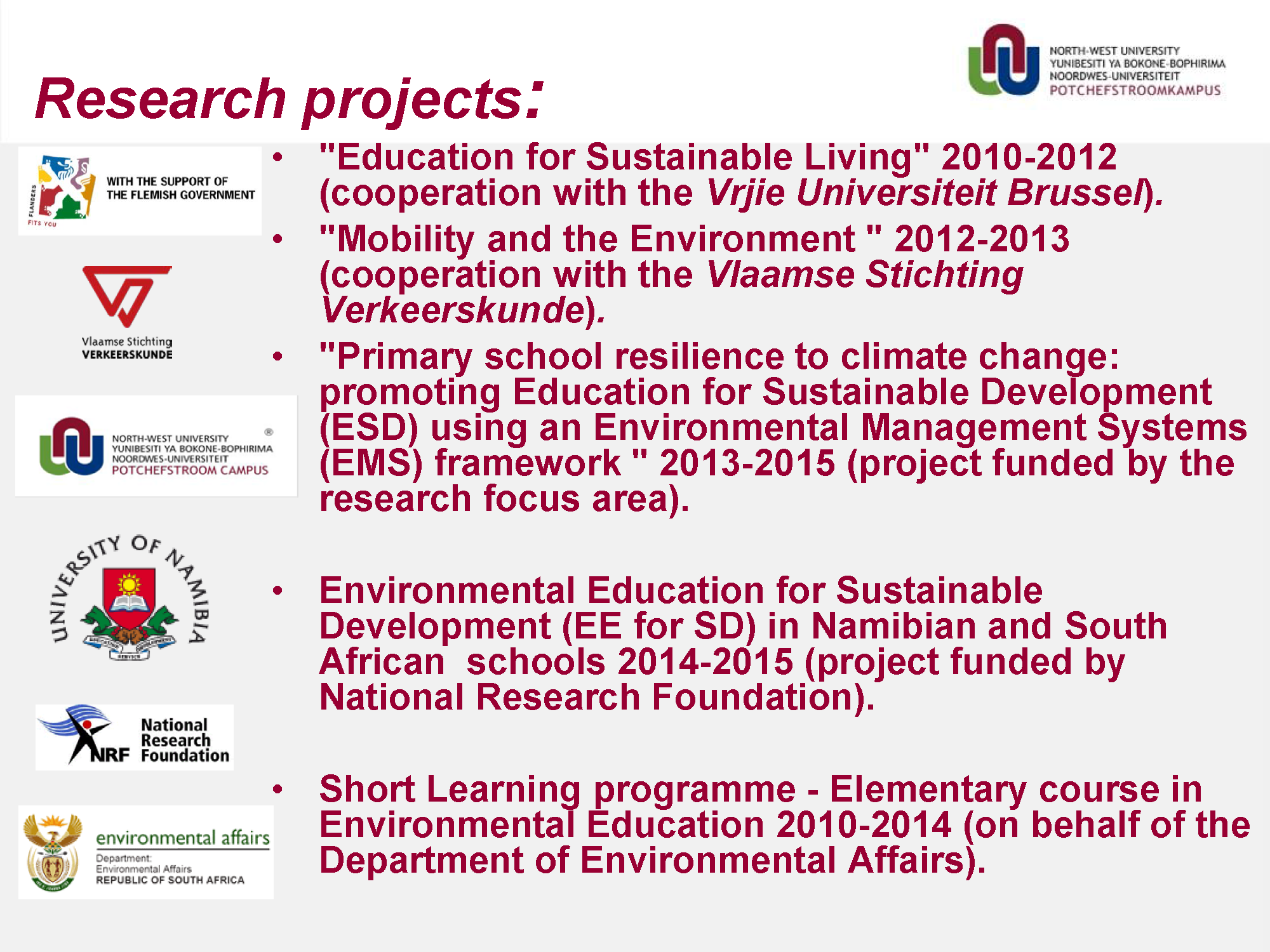School of Natural Sciences and Technology for Education
EEforSD (Environmental Education for Sustainable Development)
Was established as a zero research niche area in January 2016. The focus for 2016 and 2017 is to transform learning and training by researching the integration of sustainability principles into all education and training environments. Our research strives to build the capacity of pre- and in-service teachers to deliver environmental education for sustainable development successfully. The tree has been used as a symbol for EEforSD since it refers to transformation and liberation, union and wellbeing, stability and strength, nourishment, and growth.

Environment Education for Sustainable Development is a cross curriculum approach that needs to be accommodated in all subjects offered at school and also in the training of student teachers.
The research niche, EEforSD, aims transform learning and training by researching the integration of sustainability principles into all education and training environments. The research strives to build the capacity of pre- and in –service teachers, as well as trainers to deliver EE for SD effectively. The aim is to generate new knowledge at a higher education level amongst students and amongst teachers in the basic education sector. We aim to promote environmental education subject matter knowledge, skills and pedagogy to stimulate trans disciplinary teaching and learning in schools. We aim to expose teachers to new teaching practices and establish its role in the promotion of critical thinkers and citizen scientists amongst learners. We aim to promote and research teachers’ self- efficacy beliefs or judgments of their capabilities to bring about desired outcomes of learners’ engagement and learning, and their commitment to teaching about climate change.
The four foci of research are:
1. Environmental management for sustain-able development: Focuses on the incorporation of sound environmental management systems into the management of the school a whole school approach.
2. Environmental issues and ESD: The focus is to research critical environmental issues (climate change, biodiversity, disaster risk reduction, sustainable consumption and production) and emphasize it in the curriculum to support sustainable development.
3. Socio-environmental factors in sustainable development: The focus is to research the role of environmental values and practices of teachers and learners for societal transformation so as to create a more just, peaceful, tolerant, inclusive, secure and sustainable world.
4. Local ecological /indigenous knowledge in sustainable development: Research the place of indigenous knowledge systems of different cultural groups in environmental education to create a better understanding of the role of society in the transformation toward sustainability.
Staff
The Environmental Education for Sustainable Development niche has 5 permanent members
Dr Luiza de Sousa
Dr Anette Hay
Dr Pieter Swarts
Me Irene Muller
Mnr Aubrey Fransman
Post-doc fellow Dr Cathy Dzerefos
Researchers Prof Barry Richter & Dr Schalk Raath
News
Member of IUSDRP
The Faculty of Education Sciences has joint the Inter-University Sustainable Development Research Programme (IUSDRP). EEforSD is committed to the cause of sustainability research and where possible engages in the international activities undertaken by IUSDRP that is led by Prof. Walter Leal Head of the Research and Transfer Centre “Applications of Life Sciences“, Hamburg University of Applied Sciences.
Inter-University Research Programme over 100 universities collaborating on sustainable development research across the world.
New programme presented from 2018
BEd Hons in Environmental Education
New Programmes on the horizon:
MASTER OF EDUCATION IN ENVIRONMENTAL EDUCATION.
This programme is planned as a structured (course work) masters between the Faculty Education (NWU) and the University of Namibia
Memorandums of Agreement
University of Namibia
The Faculty of Education Sciences and the University of Namibia have signed a memorandum of agreement aimed at the development and offering of a joined structured (course work) master’s degree (MPhil) in education for sustainable development. The contract will remain active for three years.
Projects-past and present
Past Project involvement

Soil project
The niche was involved in a Soil project with six Primary Schools in Rustenburg. We enabled teachers to educate learners and the greater community about the importance of soil in climate change mitigation.
Guest at Seminar in Maputo 3-4 October 2016
Dr Luiza de Sousa was invited by Dr. Dino Milisse (Director of the Nasional Museum of Geology in Maputo Mozambique) to the “1st Seminar of the Second Phase on Institutional Capacity Building for Environmental Education in Technical-Vocational Schools". She made contact with colleagues who present environmental education at Eduardo Mondlane University. The theme of the seminar was "Educated Society, Healthy Environment." Dr De Sousa was asked to do two presentations in Portuguese, Environmental Management Systems in the Schools of South Africa and Namibia; and Environmental management in South Africa - Implementation at North-West University & experiences in schools.
Publications
Article publications
Dzerefos C.M., Witkowski E.T.F. & Kremer-Köhne S. 2017. Aiming for the biodiversity target with the social welfare arrow: Medicinal and other useful plants from a Critically Endangered grassland ecosystem, Limpopo Province, South Africa. International. Journal of Sustainable Development & World Ecology. 24(1):52-64. http://dx.doi.org/10.1080/13504509.2016.1174963
de Sousa, L.O., Richter, B.W. & Raath, S.P. 2017. Sustainable Environmental Management Indicators in South African Primary Schools. Sustainability. Sustainability, 9(5): 854; doi:10.3390/su9050854
Dzerefos C.M. & Witkowski E.T.F., 2016, ‘Bridging the knowing–doing gap in South Africa and the role of environmental volunteer groups’, Koedoe,58(1), a1394. http://dx.doi.org/10.4102/koedoe.v58i1.1394.
Muller, I. & Tempelhoff. J. 2016. The application of a resilience assessment approach to promote campus environmental management - A South African case study. International Journal for Sustainability in Higher Education, 17(2): 228-245
Raath, S.P.& Hay, E.A. 2016. Self-efficacy: A South African case study on teachers’ commitment to integrate climate change resilience into their teaching practices. Cogent Education, 3: 1-13.
Raath S.P. & Golightly A. 2016. Geography education students’ experiences with a problem-based learning fieldwork activity. Journal of Geography.
Dzerefos C. M., Erasmus B.F.N., Witkowski E.T.F. & Guo D. 2015. Modelling the current and future dry-season distribution of the edible stinkbug Encosternum delegorguei in sub-Saharan Africa. Entomologia Experimentalis et Applicata. 156: 1-13. DOI: 10.1111/eea.12309
Dzerefos C.M. & Witkowski E.T.F. 2015. Crunchtime: sub-Saharan stinkbugs, a dry season delicacy and cash cow for impoverished rural communities. Food Security: The Science, Sociology and Economics of Food Production and Access to Food. 7 (4): 919-925. DOI 10.1007/s12571-015-0479-0
Golightly, A. & Raath, S. 2015. Problem-based learning to foster deep learning in pre-service Geography teacher education. Accepted for publication. Journal of Geography, 114 (2) 58-68. March-April.
Kanyimba, A.T., Richter, B.W., Raath S.P. 2015. The integration of pedagogical aspects in Environmental Management Systems in selected South African primary Schools. African Educational Review, 12(2), 232-252.
Kanyimba. A.T., Richter. B.W. and Raath S. 2015. Promoting Education for sustainable development through implementation of Environmental management practices in selected South African primary schools. Africa Education Review. 12 (2) 232-252. ISSN: 1814-6627 (Print) 1753-5921 (Online)
Swarts, P., Rens, J. A. & De Sousa, L.O. 2015. Working with environmental education pedagogies in Life Orientation to enhance social and environmental responsibility. Southern African Journal of Environmental Education, Vol. 31:98-109.
Dzerefos C.M., Witkowski E.T.F. & Toms R. 2014. Use of the stinkbug, Encosternum delegorguei (Hem., Tessaratomidae) for food and income in South Africa. Society and Natural Resources. 27(8): 882-897.
Dzerefos C.M. & Witkowski E.T.F. 2014. The potential of entomophagy and the use of the stinkbug, Encosternum delegorguei Spinola (Hem., Tessaratomidae) in sub-Saharan Africa. African Entomology. 22(3): 461-472.
Kanyimba A.T., & Raath, S.P. 2014. Developing elementary understanding of environmental education concepts among selected in-service primary school teachers in South Africa. Naunces of teaching learning and research. Research and publication book series 3 (1)61-79.
Kanyimba A.T., Richter B.W. & Raath S.P. 2014. The effectiveness of an environmental management system in selected South African primary schools. Journal of Cleaner Production 66 (4) 479 -488
Dzerefos C.M., Witkowski E.T.F. & Toms R. 2013. Comparison of the ethnoentomology of stinkbug use in southern Africa and sustainable management considerations. Journal of Ethnobiology and Ethnomedicine. 9: 20. https://ethnobiomed.biomedcentral.com/articles/10.1186/1746-4269-9-20
Kanyimba, A.T., Richter, B.W., & Raath S.P. 2013. The effectiveness of an environmental management system in selected South African primary schools Journal of Cleaner Production, 66: 479-488, March.
Raath, S. & Warnich, P. 2012: From a concentration camp to a modern day school: A socio-cultural and historical-environmental perspective to learning in developing a new identity in post-apartheid South Africa Yesterday & today, 7:139-167, Jul.
Hens. L., Wiedemann. T., Raath. S.P., Stone. R., Renders. P., Craenhals. E. & Richter. B.W. 2010. Monitoring environmental management at primary schools in South Africa. Journal of Cleaner Production, 18 (7): 666-677.
Hens L., Wiedemann T., Raath S., Stone R., Renders, P. & Craenhals E. 2010. Performance of newly implemented Environmental Management Systems in primary schools in South Africa Journal of Environmental Management, 91 (4):906-917. March-April.
Leal Filho, W., Brandli, L.L., Becker, D., Skanavis, C., Kounani, A., Sardi, C., Papaioannidou, D., Paco, A., Azeiteiro, U.M., de Sousa, L.O., Raath, S.P., Pretorius, R., Shiel, C., Vargas, V., Trencher, G. & Marans, R.W. 2018. Sustainable Development Policies as Indicators and Pre-Conditions for Sustainability Efforts at Universities: fact or fiction?, International Journal of Sustainability in Higher Education, 19 (1):85-113 October. ISSN 1467-6370 DOI: 10.1108/IJSHE-01-2017-0002 https://doi.org/10.1108/IJSHE-01-2017-0002
Muller, I. 2017. A context Specific Framework Approach to Community Based Monitoring, International Journal of Environmental & Science Education, 12(10): 2153-2175 http://www.ijese.net/makale/1978
Chapters published in books
Kanyimba A.T., Raath, S.P. 2016. Evaluating an environmental learning programme in developing understanding of environmental education concepts amongst selected in-service primary school teachers in South Africa. (In Mokoena M. A., Oosthuizen I.J., 2016. A scholarly contribution to Educational Praxis. Chapter 6 AOSIS Publishing.)
Raath S.P. Ramsaroop, S., Tembon, F., & Harris, E. 2012. Mobility and the Environment. Platinum Press.
Hens L., Wiedemann T., Raath S., Craenhals E., & Richter B. 2011. Capacity building for environment learning and sustainable living .Environmental management systems in schools in South Africa (pp. 55) Nova publishers.
Raath, S.P., Stone, A.B., & Van Heerden, M.F.D. 2009. Education for Sustainable Living: NWU/Vrjie Universiteit van Brussel.
Raath, S.P., Stone, A.B., & Van Heerden, M.F.D. 2006. Building capacity for sustainable living. Centurion: Mediakor.
Raath, S.P., Stone, A.B., & Van Heerden, M.F.D. 2005. Environmental management in schools. Centurion: Mediakor.
Conferences
WEEC 2017

